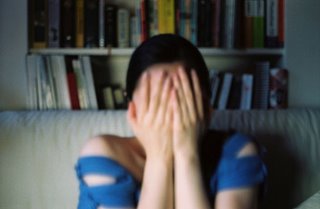There's also the dynamics of the session itself. (Or the moment, if it's a snap.) You can argue who has more control, the one behind the camera, or the one in front of the lens. In the later part of his career, Mr. Avedon, whom I adore and respect, was convinced that the photographer has absolute control. I understand what he means, and while I agree that the photographer does make a lot of decisions, still, there's no shot if there's nobody on the other side. Not every shoot can be like this, but the best is when there is space for an exchange. The relationship is hopefully not antagonistic. Hopefully, if they're sitting there, they want to to some degree, and there can be a level of trust. How giving is this person, and how giving am I?
Let me look at you, let you return my gaze, and let's see what happens.


4 Comments:
Yvonne - Wow, that's very insightful and I can't put it in better words...having been on the other side of the camera, i.e. the "subject" there is def. chemistry with different ppl and it's a dynamic relationship. I think what it boils down to is some very fundamental elements that you can't quantify. When you look a certain person, the way she shoots a glance at you, how she moves etc etc, it's catching that human feeling or certain emotion. Some ppl just exude that quality that makes you want to react or strikes a cord within you, perhaps that's what being human is all about
Evie-chan!
Thanks for writing back, and thanks liking my little jumble of thoughts.
One of my instructors said to us, you can't shoot what you're not. I think it's true, cos your personality, demeanor, amongst other things, that's all going into your shot whether you like it or not. And part of that is the interaction you have with the person you're shooting.
You said something about catching a feeling or emotion, but a lot of times it takes *creating* an emotion and shooting it in order to catch it on film. When you're holding a camera, and they see you with a camera, you need to take that into the equation. If you see someone looking so absolutely beautiful and real with emotion, the moment you pull out a camera, it's like disturbing a pool of still water you've sent ripples all over. I sometimes wish I had a camera implanted into my eye... then I can truly catch and record unobtrusively. :P
(Okay, hope that makes a bit of sense... it's way too late, and I'm gonna crash now. ack.)
"I sometimes wish I had a camera implanted into my eye... then I can truly catch and record unobtrusively. :P"
One of the reasons I liked my swivel-body Nikon so much was because people are used to cameras pointing -forward-...so I could take pictures off to the side with people who knew a camera was out, but subconsciously assumed it wasn't pointed at them.
I'd also like an eye-camera for convenience (portability, quick-click to capture things that won't wait for pulling out a handheld) and so I could frame things using my own field of vision if I wanted to. :P
--Eric
There is a difference between using a point-at-you view finder (most 35mm SLRs) and waist level finders (some medium format models)... it feels a little less like you have a weapon aimed at you somehow. Though many times it's whether you *feel* the gaze, even if you can't see it... if you know what I mean. :P
Post a Comment
<< Home